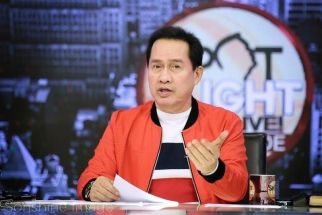Speaker on VP: We’ll do our constitutional duty
MANILA, Philippines - We will do what we have to do.
Speaker Pantaleon Alvarez said this yesterday in response to statements of President Duterte to stop the impeachment initiatives against Vice President Leni Robredo.
“We respect the President, but we have to do our duty as mandated by the Constitution,” Alvarez said.
“There are issues where we agree with the executive branch, so we support these. But there are also issues where we may not agree with the executive, so in that particular case we will do what we have to do under the Constitution,” he said.
Several lawyers, including an official of the interior department, also announced yesterday that they would pursue Robredo’s impeachment.
Technically, there is still no impeachment complaint against Robredo.
Lawyer Oliver Lozano and veteran radio broadcaster Melchor Chavez failed to get any congressman to endorse their impeachment complaint, as required by the rules.
The two complainants were hoping Alvarez would endorse the complaint, but the Speaker was no longer available since Congress went on a Lenten break since March 15.
The only impeachment complaint lodged at the House of Representatives was that against Duterte, filed by Magdalo party-list Rep. Gary Alejano.
“Guys, lay off. Stop it. You can do other things but do not tinker with the structure of the government. I will not countenance it. She was elected,” Duterte said, referring to Robredo, upon his arrival from Thailand before dawn yesterday.
Minions?
Despite Duterte’s appeal to lay off on the impeachment plan against Robredo, a group of lawyers and academics yesterday said they would proceed with the case buildup against the Vice President.
Interior Assistant Secretary Epimaco Densing III joined lawyers Bruce Rivera and Trixie Cruz-Angeles in a press briefing in Quezon City to announce their plan to proceed with the filing of the impeachment complaint against Robredo when Congress resumes session on May 2.
Also joining them were professors Antonio Contreras and Tom Berenguer, as well as actress Vivian Velez and a number of Duterte supporters.
Densing clarified that he would not pursue the impeachment complaint in his official capacity as a government official. Civil service rules prohibit government personnel from getting involved in politics or participating in a political activity.
Densing accused Robredo of betrayal of public trust when she spoke against the country in a video played at a side session of the United Nations Commission on Narcotic Drugs meeting in Austria last week.
“Leni Robredo has gone too far. The means in which she has conducted herself since assuming office has been inimical to the public interest, ruinous and prejudicial to the economy, erodes confidence in the legal system and government and places the honor and dignity of the Filipino people to naught,” the group said in a statement.
“We have long watched her and done our duty by calling her out on social media despite concerted means to silence us,” they added.
Asked for their reaction to Duterte’s call to stop the impeachment plan against Robredo, Rivera said they would not file the complaint on behalf of the President.
“We understand the President’s predicament because he wants the best for the Filipinos. Perhaps he wants to stay away from this trouble. But we’re not doing this for the President, we’re doing this for the Filipino people,” Rivera said.
“We’re not the President’s minions,” he added.
Rivera was a lawyer of businesswoman Janet Lim-Napoles, the suspected mastermind of the multibillion-peso pork barrel scam.
Napoles is serving time following her conviction for the illegal detention of pork barrel scam witness Benhur Luy.
Angeles, on the other hand, was the lawyer of then fugitive ex-soldier and now Customs Commissioner Nicanor Faeldon.
The Supreme Court suspended her for three years in connection with a marriage annulment case, in which she allegedly failed to produce an annulment petition despite the payment of a P350,000 fee by her client.
Even before they could draft the impeachment complaint, the group said it is now convincing several congressmen to endorse it.
If it materializes, it would be the second complaint against Robredo. Lozano presented his petition last week to Alvarez.
The group said their articles of impeachment would allege Robredo committed betrayal of public trust and culpable violation of the Constitution, although they declined to cite specific incidents aside from what they dubbed as “false allegations” that she made in the UN video.
They also called on other lawyers who wish to work with them in the case buildup against Robredo.
Once finalized, the group said they will forward a copy of their complaint to Alvarez, who earlier said he will endorse an impeachment against Robredo, provided it is sufficient in form and in substance as required under the rules.
For a complaint to be recognized formally by the House, it should be endorsed by at least one member of the chamber.
Alvarez, for his part, assured Robredo, a former Camarines Sur congresswoman, of “due process.”
“If we see that the complaint has basis in form and substance, we will go through it. As soon as we endorse to the Senate the impeachment complaint, the Senate is mandated to constitute themselves as an impeachment court,” he said.
Sources said Alvarez has already gathered at least 97 signatures, the basic requirement needed – one-third of the total 293 House membership – to send the Robredo impeachment to the Senate for trial without going through the House justice committee.
Impeachment complaints have to be studied thoroughly and contrary to popular perception, it is not merely a numbers game, he said.
“We have to study it thoroughly. This is not a numbers game, we have to look into the substance of the complaint,” Alvarez stressed.
Should the impeachment of Robredo push through when Congress resumes session on May 2, it would be reminiscent of the late chief justice Renato Corona’s case where 185 lawmakers signed the petition and sent it directly to the Senate for an impeachment trial.
A political process
Supreme Court spokesman Theodore Te agreed with the observations that the impeachment process is not entirely a numbers game in Congress as many perceive it to be.
While it is a political process by nature where party alignments matter the most, Te said impeachment can also involve legal issues that only the high tribunal may be able to settle.
Te explained there are “justiciable issues” in impeachment proceedings that may be subject to judicial review, citing previous cases that the high court had ruled upon.
“There have been instances where the Supreme Court has been asked to come in, but on very, very limited issues,” Te said in an interview with CNN Philippines.
He cited the impeachment cases against retired chief justice Hilario Davide Jr., former ombudsman Merceditas Gutierrez, and Corona, which all reached the SC.
In the Davide case, Te explained the high court had decided on the issue involving the constitutional rule requiring only one impeachment complaint against an official per year and tackled its jurisdiction over the case.
“The Court was asked if the issue of two complaints filed within the same year can be reviewed by the court because impeachment is supposed to be a political process. But the (high) court said yes, it is a political process, but there are certain issues that are justiciable, meaning there are certain issues that the court can actually review,” he said.
In its 2003 ruling, the SC disallowed the filing of the second impeachment complaint against Davide after the House dismissed the first one.
On the other hand, in the Gutierrez case in 2010, the SC was asked to review the power of the House to conduct hearings on the impeachment case. The high court then upheld the House procedures and the former ombudsman resigned from her post in April 2011 even before her trial in the Senate could start.
In both cases, the high tribunal temporarily stopped the House from proceeding with the impeachment process pending resolution of the petitions.
Corona also filed a petition with the SC when he faced impeachment in February 2012, but the high court did not grant him relief until the Senate ordered his ouster after impeachment trial.
Te pointed out that in all cases, the SC did not touch on the grounds of the impeachment cases.
“There has been no instance where the court actually reviewed the basis for impeachment,” he stressed.
Te, a law professor, explained impeachment is a “political process to remove a public official unfit for a position.”
“It is not a criminal trial, it is not a trial per se as we understand it in the courts. It is not a judicial process. It is basically a political disciplinary process,” Te said.
“The only issue in impeachment is always fitness to continue holding the office – regardless of the grounds like bribery, graft and corruption and other high crimes like betrayal of public trust,” he said. –Jess Diaz, Edu Punay, Janvic Mateo, Edith Regalado
- Latest
- Trending

































